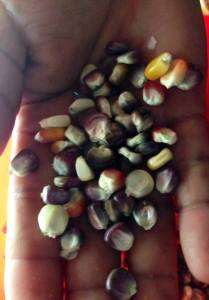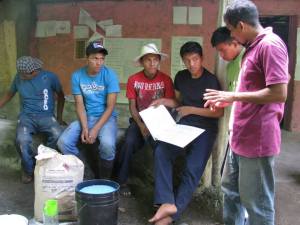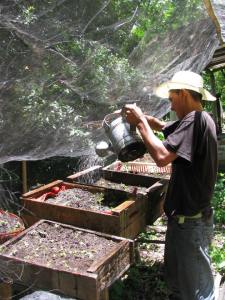Agroecological training, participative experimentation, and personal development processes for youth in Cacaopera
Campesino School is an ongoing project executed by FUNDAHMER in El Salvador. After a pilot run of the program in 2014 and project adjustments and preparations in 2015, in 2016 we supported FUNDAHMER in launching a second year of studies with young people in Cacaopera who have completed their formal education and are interested in sustainable agriculture as they begin to build their futures. In 2017, the graduates from 2016 will facilitate the curriculum for a new group of participants. Campesino School has continued in different communities in Morazan, run entirely by local technicians and producers!
In Cacaopera, Morazán, people have worked historically in agriculture, growing corn, beans, and sorghum, raising chickens, pigs, and cattle, and they have used plants and trees native to the area to meet their needs. During the Salvadoran Civil War, the population was displaced primarily to Honduras, and when they returned, “conventional” agriculture strategies were introduced. These strategies use costly industrial fertilizers, herbicides, and insecticides and promote commercially-produced seeds that are different from seeds native to the area. Young people in the region are also affected by limited access to education, scarcity of employment, and the effects of climate and environmental change; they do not have many opportunities for their futures in the region. Thus, many leave for urban centers or without documents for the United States. There is a loss of agricultural traditions in the region and with this, a loss of appreciation for campesino culture and life. Within this panorama, we can identify five central topics to address: food sovereignty, care for the environment, education, employment, and immigration.
Campesino School was born in response to the above-mentioned problems. The idea, in general, is to train young people in the region of Cacaopera, Morazán to be able to practice sustainable agriculture as a source of work and food for their families. We also hope to touch on other topics important to their contexts, such as art, sports, and music. What we want to do is to make a space and some technical and didactic resources available so that young people might discover the value of their cultural and occupational heritage by creating opportunities to build a life locally, and in order to care for the agricultural traditions and ecology of the region.
In 2017, former graduates will collectively facilitate the curriculum for new students, with changes and updates as they see fit. They also plan to take some of their experience with vegetable gardening into the local schools. For those familiar with FUNDAHMER’s work, this will involve young people from the communities of Flor Muerto, San Pedro, Junquillo, El Rucio, Salamo, Jimilile, and San Miguelito.
Long term, we plan to continue making improvments to the land, in particular around water infrastructre and reforestation. As more students graduate, they also hope to work collectively to produce artisanal and sustianable agricultural supplies like insect repellent and fertilizer to sell on a local level. We as FACES are very proud of this project, especially the way in which the participants have taken ownership of it and keep it going with innovative ideas and community-focused goals.
Make a tax-deductible donation by check or online HERE
Check out FUNDAHMER’s report from 2016!





























